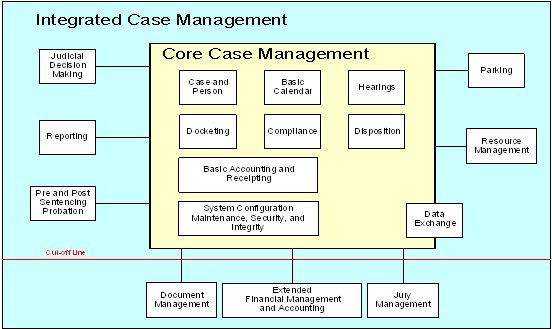| |
Core Case Management System

Core case management includes:
- Case and Person: Initiate a case record, create and maintain its index. Person (parties and participants) information is entered and associated with the case, and contact and identifier information is captured for individuals, court officials, organizations, attorneys and other entities. Includes facilities for searching for existing names.
- Basic Calendar: Scheduling of upcoming events, creating, formatting, maintenance, and distribution of court calendars for each type of hearing and conference.
- Hearings: Activities associated with reaching a decision in calendared events, recording the results of these events, and notifying the appropriate persons of court decisions, which may include activities related to court ordered pre-trial services and pre-sentence investigations (Compliance) as well as non-financial bail management.
- Docketing (register of actions or events): Activities associated with entering case history information or case events into the court record. Docket entries are made during case initiation and subsequently throughout the duration of an active case.
- Compliance: Activities related to compliance with judgments, court orders, sentences, and supervision conditions, which may be imposed pre or post sentence.
- Disposition: Activities associated with the disposition of a case, parties, or charges/allegations in a case, including any type of disposition resulting from a court decision after jury or non-jury trial, guilty plea, dismissal, bound over, transfer out to another jurisdiction, consolidation, or bail forfeiture; or in civil matters such as mediation or arbitration, default dismissal, withdrawal, settlement, transfer out to another jurisdiction or consolidation.
- Basic Accounting and Receipting: Maintaining account, case and person financial records; conducting internal and external funds transfers, produce statements and other documents commonly performed at the end of an accounting period (e.g., daily, weekly, monthly). Activities that track collections of funds, issuing of receipts, cashier closeout, cashier management, recordkeeping and reporting functions commonly performed at the end of an accounting period.
- Basic System Configuration Maintenance, Security and Integrity: Activities associated with ensuring the security and integrity of the case processing system, its data and its documents during normal operations and after a system failure or outage. This function also deals with the rules set up in the code translation tables; for example, the charge severity hierarchy, fines based on violation and local business rules, priority ranking for funds collected, funds paid out, and for reconciliation of all fund categories distributed as provided by ordinance, order, or law.
Benefits include:
- Reduced training and support overhead through a user friendly, intuitive application.
- Reduced redundant data entry and data errors through an improved data entry process.
- Improved real-time access and distribution of judicial decisions (judgments, sentences, etc.) through automated orders.
- Reduced time spent maintaining tables and rules by allowing local users to maintain tables, rules, and security as needed.
- Reduced cost per case and time per case by developing meaningful accounting and performance measures and using better statistical information.
|
|









